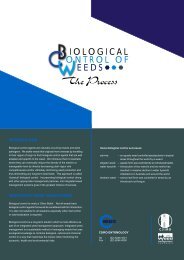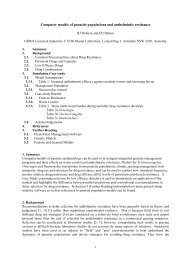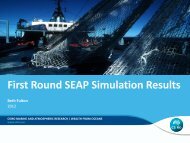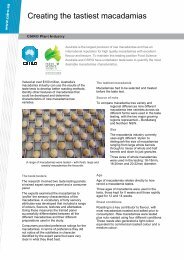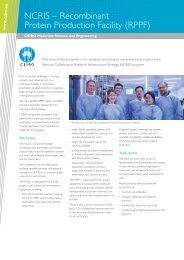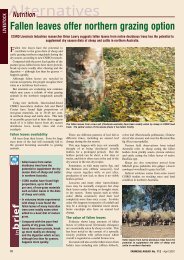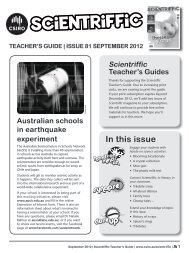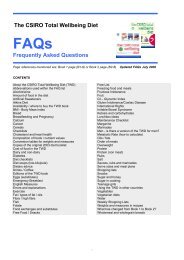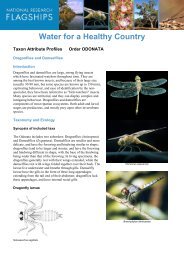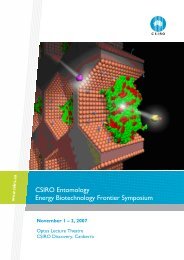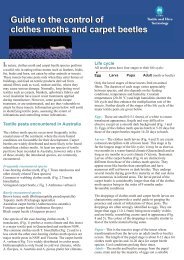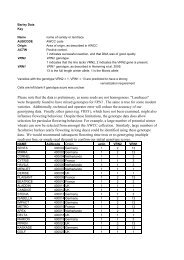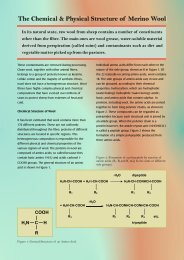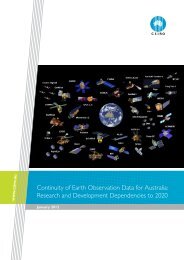WfHC - cover page (not to be used with pre-printed report ... - CSIRO
WfHC - cover page (not to be used with pre-printed report ... - CSIRO
WfHC - cover page (not to be used with pre-printed report ... - CSIRO
Create successful ePaper yourself
Turn your PDF publications into a flip-book with our unique Google optimized e-Paper software.
Marcus Bar<strong>be</strong>r: How do you catch the crayfish? Do you use a lot of people?<br />
Philip Yam: No, 4 people 2 people. A couple of people is plenty.<br />
Viv Sinnamon: Sometimes you have people on the side, but mostly it‟s just holding the net<br />
down and pulling them in the net. It‟s one of those little fine mesh nets.<br />
Philip Yam: At T-Bone waterhole if you want <strong>to</strong> get a feed you don‟t need a net. You just go<br />
in there and grab them by hand.<br />
Viv Sinnamon: The old people <strong>used</strong> <strong>to</strong> drag bushes and stuff, or catch them by hand.<br />
Although there was a <strong>pre</strong>ference for bush food, particularly aquatic species, cows were and<br />
are still a part of the diet for Oriners people. Cows often came in close <strong>to</strong> the homestead<br />
during the wet season, but it was still <strong>be</strong>neficial <strong>to</strong> have multiple people <strong>to</strong> transport the meat:<br />
[In the wet] you can see water, water all through them trees. You could <strong>not</strong> go anywhere in<br />
February and March. Couldn‟t go nowhere. Norman and I <strong>used</strong> <strong>to</strong> go out for the killer when<br />
there was no rain. [We‟d] pack bags on pack horse, put some meat in the pack bags. We<br />
could <strong>not</strong> go far. Too boggy.<br />
Ezra Michael<br />
In more recent times the rain and boggy ground made locating cattle for food easy, but the<br />
absence of horses made transporting meat more difficult, meaning it was <strong>be</strong>tter <strong>to</strong> use larger<br />
num<strong>be</strong>rs of people:<br />
Marcus Bar<strong>be</strong>r: Was that fun staying at Oriners in the wet <strong>with</strong> 5 people? Or <strong>to</strong>o many<br />
people in a small space?<br />
Philip Yam: No it was good fun. We got plenty of fellers <strong>to</strong> have fun.<br />
Louie Native: And especially you‟ve got plenty of hands, <strong>to</strong> kill meat.<br />
Philip Yam: Because sometimes you want meat you‟ve got <strong>to</strong> walk <strong>to</strong> get it<br />
Louie Native: You can‟t drive…<br />
Philip Yam: Carry it <strong>with</strong> bag.<br />
Louie Native: Carry it back home <strong>to</strong> the homestead.<br />
Philip Yam: You don‟t have <strong>to</strong> go <strong>to</strong>o far <strong>to</strong> get killers. They come right <strong>to</strong> the homestead.<br />
Louie Native: Because it‟s high ridge there.<br />
Bush food is clearly a significant aspect of life at Oriners, and one of the attractions of going<br />
there. However it has never <strong>be</strong>en the primary motivation for travelling <strong>to</strong> and living in the area<br />
during remem<strong>be</strong>red his<strong>to</strong>ry. Work of various kinds has usually <strong>be</strong>en the priority; pas<strong>to</strong>ral<br />
work, land management work, and the work associated <strong>with</strong> establishing and maintaining<br />
appropriate infrastructure. Paddy Yam commented that during mustering times in the<br />
pas<strong>to</strong>ral era, time for hunting for food was limited. However based on the comments above it<br />
is clear that there were significant „down time‟ periods at other times of the pas<strong>to</strong>ral year,<br />
<strong>not</strong>ably during the main wet season. Although constrained by the boggy ground, these<br />
periods did provide people <strong>with</strong> time <strong>to</strong> access food from the surrounding landscape. More<br />
recently, the different pace and rhythm of land management work, as well as greater<br />
num<strong>be</strong>rs of people staying at Oriners for non-work related reasons, had increased<br />
opportunities for hunting and fishing <strong>be</strong>fore the recent decline in residence. Therefore<br />
hunting for bush food is likely <strong>to</strong> <strong>be</strong> a significant feature of life for people should a largely<br />
permanent <strong>pre</strong>sence in the area <strong>be</strong> re-established in the future.<br />
Working Knowledge at Oriners Station, Cape York<br />
93



